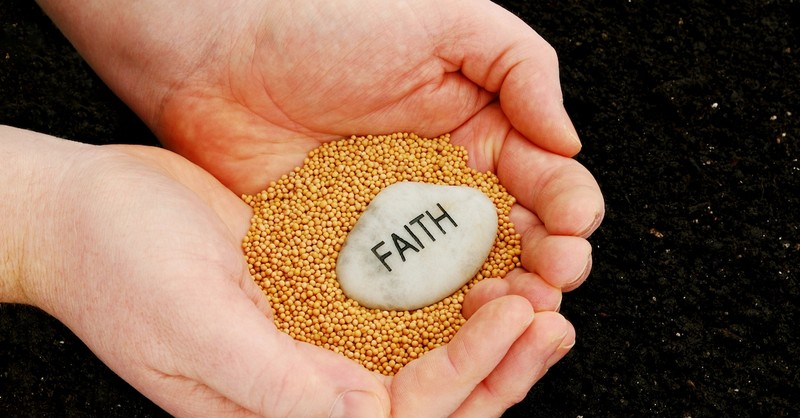
“Do not be deceived: God is not mocked, for whatever one sows, that will he also reap,” Galatians 6:7.
For many people, the word ‘karma’ is used interchangeably with the biblical concept of reaping what you sow. And that’s understandable, given how these two principles sound like the same exact thing. However, they are two very different concepts.
If we aren’t careful, we can easily mistake karma and reaping what we sow as being one in the same. Christians must be mindful of the difference, or we run the danger of erring in our understanding of what Christ did on the cross, what the Holy Spirit is currently working out in us, and the truth about eternity.
Here are three differences between karma and reaping what you sow:
Photo Credit: Unsplash/Brooke Cagle

1. The Meaning of Karma
The word ‘karma’ was in my vocabulary before I ever understood the biblical principle of sowing and reaping. Before I ever knew Jesus Christ as my personal savior, I knew what karma was. When I came into the knowledge of Christ and his Word, I knew something didn't line up between what karma taught and what the Bible tells us.
According to the Ancient History Encyclopedia, karma is the belief that good and bad experiences in this life are the sum result of deeds done in both the current and previous, lives. Karma is supposed to help us make sense of why we may be going through certain situations. It also gives us rationalization for the cycles of birth and death.
On a surface level perspective, karma bridges the gap between good actions (or intentions) and good results as well as bad actions (or intentions) and bad results. Essentially, what a person reaps in this life can be a consequence of what they sowed in their previous lives. What a person sows now, they will reap in future life. And karma can accumulate, giving you a chance to balance out positive or negative consequences.
Photo Credit: ©Getty Images, Chinnapong

The Meaning of You Reap What You Sow
Sowing and reaping in a Christian’s life of faith relate to the eternal implications that faith has on the Kingdom of God.
In Hebrew, “to ‘sow” means “to conceive, to bear, or to yield,” (Strong’s Hebrew 2232). “To reap” means “to harvest.” Sowing and reaping can both be applied to the Christian’s life on earth as well as in eternity. However, it’s different from Karma in that faith in Jesus Christ is a major component.
I find it interesting how similar in verbiage and basic understanding these two concepts seem to be. Without the knowledge of Christ and the discernment of the Holy Spirit, I believe we could easily mistake one for the other. However, both of these principles have very different effects on our beliefs and ways of thinking.
Photo Credit: Getty Images

2. The Source of Karma
One primary difference between karma and the biblical concept of sowing and reaping is their source. Knowing where certain practices and concepts originate helps give us discernment in recognizing what is godly and what is ungodly. We can sift through the gray areas and look at the historical truths of these two principles to get a clearer picture of what we should be doing, saying, and believing.
Karma originates from the Hindu tradition. According to the Ancient History Encyclopedia, the first mention of karma appeared in a text called Rigveda, which is the oldest known Hindu text.
As time passed, different cultures and traditions have taken the concept of karma and have added different details to it, so, the law of karma ranges depending on geographical area.
Photo Credit: Getty Images/ Chunumunu

The Source of Reaping and Sowing
The principle of sowing and reaping is a biblical concept found all throughout the Word of God.
“Do not be deceived: God is not mocked, for whatever one sows, that will he also reap. For the one who sows to his own flesh will from the flesh reap corruption, but the one who sows to the Spirit will from the Spirit reap eternal life. And let us not grow weary of doing good, for in due season we will reap, if we do not give up,” Galatians 6:7-9.
As believers, we are to stand on the Word of God as the highest authority, and God wants us to live in accordance with what is written in it. The Word of God is our spiritual sword. It is sharp enough to divide truth from non-truth, but only when we don't dilute it.
When we mix the biblical concept of sowing and reaping with karmic beliefs, we run the risk of diluting God’s Word. And we become more lenient and accepting of the things of this world. Whether we mean to do so or not, we can actually find ourselves compromising the Word of God in our lives. This is why it's important to test all things against scripture. Karma, from the root of its foundation, is something that speaks against what the word teaches us.
Photo Credit: Unsplash

3. Implications of Belief and Thought Processes
In the principle of karma, the good or bad things that a person does will impact them both now and in their next life. There is the belief that if we do certain things through goodwill, acts of charity, and our personal service to mankind, we can store up goodness for ourselves. Karma makes us believe that if good (or bad) things happen to us, we deserve it because of something that we've done either in this life or a past one.
Scripture teaches us that “God gives his sunlight to both the evil and the good, and [that] he sends rain on the just and the unjust alike,” Matthew 5:45. According to scripture, we cannot simply do good and expect only good to happen to us (or the reverse).
The Book of Ecclesiastes speaks about this same phenomenon,
“It is the same for all, since the same event happens to the righteous and the wicked, to the good and the evil, to the clean and the unclean, to him who sacrificed and him who does not sacrifice. As the good one is, so is the sinner, and he who swears is as he who shuns an oath,” Ecclesiastes 9:2.
Photo Credit: Unsplash

"Good and bad happens to all of us."
Since we live in a fallen world where there is sin, we are all impacted by sin. Good and bad happen to all of us, whether we are believers or non-believers. This is a mystery that we do not understand.
Because both good and bad happen to believers and non-believers alike, faith in Christ for eternal hope is the major dividing line between karma and sowing and reaping.
Karma teaches that there are multiple lives, and thus, multiple chances to do good, atoning for the bad that has been done. The principle of sowing and reaping teaches that regardless of what we’ve done when we accept Christ into our lives, we accept his Spirit. And with his Spirit comes freedom. There is an eternal life that we reap from the Spirit as we sow by the Spirit (Galatians 6:8).
Photo Credit: ©Getty Images/Marcos Calvo

"With sowing and reaping, we see that Jesus Christ did the work for us."
If we speak Karma over our lives, we are saying that we can earn our way into a good or bad life. If we speak the biblical principle of sowing and reaping over our lives, we are saying our faith in Christ presses us on towards living by the Spirit.
Doing this leads us to establish the fruits of the Spirit which are love, joy, peace, patience, kindness, goodness, faithfulness, gentleness, and self-control (Galatians 5:22). When we sow these things in our lives, good things result, but not because of our own will to do good. It's because faith, which covers us and gives us access to God and the power of his Spirit.
I honestly believe that the more we press into a relationship with Christ by faith, the less we focus on temporary things like this life, which is passing away. And we grow more concerned with how what we do now impacts the Kingdom of God. Sowing and reaping turn our hearts towards eternal things.
These two opposite belief systems give us completely different thoughts to live by. With Karma, we think that we can work ourselves into a better life. With sowing and reaping, we see that Jesus Christ did the work for us. He paid our price to enter into eternity with him in heaven on the cross. There is nothing more that we need to do other than live a faithful life.
Photo Credit: Unsplash

"We have been justified by faith."
I pray that you understand and hold onto the biblical principle of sowing and reaping for your life. I pray that you know fully that God has given you a gift that you could never earn or receive through karma.
We have been justified by faith. As a result, we are to live and love by faith, grabbing hold of all the promises of God. Amen.
Britnee Bradshaw is a free-spirited, Old Navy-wearin', coffee-shop lovin', wife and momma. She serves in the worship ministry with her husband at their home church in Glendale, AZ, and writes with the sole purpose of pointing others to Christ. You can catch up with her on her blog, On The Way Up, or via social media @b_brdshw!
Photo Credit: ©GettyImages/MrsOKeefe
Originally published Monday, 17 January 2022.








